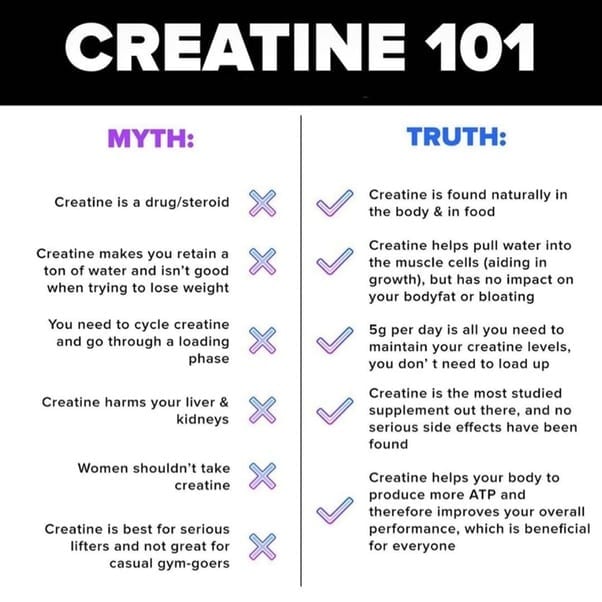Is Creatine Safe? Exploring The Benefits And Risks Of Creatine

Table of Contents
Keywords: creatine, creatine safety, creatine benefits, creatine risks, creatine supplementation, creatine side effects, is creatine safe, creatine usage
Creatine. The word conjures images of bulging biceps and record-breaking lifts. But for many considering adding this popular supplement to their fitness regimen, a crucial question arises: is creatine safe? This comprehensive guide delves into the benefits, risks, and proper usage of creatine, empowering you to make an informed decision about its role in your health and fitness journey.
The Benefits of Creatine Supplementation
Creatine supplementation offers a range of performance-enhancing and health-related advantages, making it a staple in many athletes' and fitness enthusiasts' routines. Let's examine some key benefits supported by scientific research:
Increased Muscle Strength and Power
Creatine monohydrate's primary mechanism of action lies in its ability to boost adenosine triphosphate (ATP) production. ATP is the body's primary energy currency, crucial for fueling high-intensity activities. By increasing ATP availability, creatine:
- Enhances strength and power output: Leading to significant improvements in weightlifting performance, sprinting speed, and explosive movements like jump height.
- Improves short-burst performance: The benefits are most pronounced during short, intense exercises rather than prolonged endurance activities.
- Supports athletic performance: Creatine supplementation can provide a competitive edge for athletes in various disciplines requiring strength and power.
Enhanced Muscle Growth
Beyond strength gains, creatine plays a significant role in muscle growth and development. This is attributed to its effects on:
- Muscle protein synthesis: Creatine promotes the process of building new muscle proteins, contributing to muscle hypertrophy (growth).
- Increased cell volumization: Creatine increases water retention within muscle cells, creating a "fuller" appearance and potentially aiding muscle growth.
- Synergistic effects with resistance training: Combining creatine supplementation with a consistent resistance training program significantly amplifies muscle mass gains.
Improved Cognitive Function
While primarily known for its effects on physical performance, emerging research suggests potential cognitive benefits of creatine supplementation. Some studies indicate that creatine may:
- Enhance memory and learning: Improving cognitive function, particularly in individuals experiencing cognitive decline or undergoing demanding mental tasks.
- Boost brain function: Potentially improving overall brain performance and cognitive abilities.
- Requires further research: Although promising, more research is needed to fully understand and confirm the extent of creatine's cognitive benefits.
Potential Risks and Side Effects of Creatine
While generally considered safe for healthy individuals, creatine supplementation can lead to some potential side effects. It’s crucial to understand these to manage usage effectively:
Water Retention and Weight Gain
One of the most common side effects of creatine is water retention. This means:
- Temporary weight gain: This is primarily due to increased water storage in muscle tissue, not fat gain.
- Generally harmless: The weight gain is usually temporary and dissipates once creatine supplementation is stopped.
- Manage discomfort: Adequate hydration is key to mitigate potential bloating or discomfort associated with water retention.
Gastrointestinal Issues
Some individuals may experience mild gastrointestinal discomfort, including:
- Bloating: A common side effect, especially when starting creatine supplementation.
- Cramping: Occasional abdominal cramping can occur.
- Diarrhea: Less frequent, but possible. Gradual dose increases, high-quality supplements, and adequate hydration can minimize these issues.
Kidney Issues (Rare)
The vast majority of studies show creatine is safe for kidneys in healthy individuals. However:
- Caution for pre-existing conditions: Individuals with pre-existing kidney problems should consult a doctor before using creatine.
- Risk is low for healthy individuals: Healthy individuals generally do not experience kidney problems from appropriate creatine use.
- Consult your physician: If you have any concerns about your kidney health, consult your doctor before starting creatine supplementation.
Safe and Effective Creatine Usage
Optimizing creatine usage hinges on careful selection, appropriate dosage, and mindful hydration.
Choosing the Right Creatine
The market offers various creatine forms, but:
- Creatine monohydrate is best: This is the most researched and proven effective form of creatine.
- Select reputable brands: Choose supplements from trustworthy brands that have undergone third-party testing to ensure purity and quality.
- Avoid unnecessary additives: Opt for creatine monohydrate supplements without unnecessary fillers or additives.
Dosage and Cycling
Dosage protocols vary, but a common approach is:
- Loading phase: 20 grams per day for 5-7 days to saturate muscle creatine stores quickly.
- Maintenance phase: 3-5 grams per day to maintain elevated creatine levels.
- Cycling: Cycling creatine (periods of use followed by periods of rest) is debated, but some believe it can help prevent tolerance. Consult a professional for personalized guidance.
Hydration is Key
Adequate hydration is crucial for maximizing creatine's benefits and minimizing side effects:
- Drink plenty of water: Staying well-hydrated supports muscle hydration and helps flush out potential waste products.
- Water throughout the day: Don't just hydrate during workouts; maintain hydration throughout the day.
- Individual needs vary: Your hydration needs will depend on factors like activity level, climate, and individual body composition.
Conclusion
Creatine supplementation, when used responsibly, presents a safe and effective way to enhance athletic performance and promote muscle growth. While minor side effects are possible, serious risks are rare for healthy individuals. By choosing high-quality creatine monohydrate, adhering to recommended dosages, and maintaining proper hydration, you can safely harness the power of creatine to achieve your fitness goals. If you're considering creatine supplementation, consult a healthcare professional or certified personal trainer to determine the best approach for your individual needs. Learn more about the safety and benefits of creatine supplementation today!

Featured Posts
-
 Npo Toezichthouder En Bruins Gesprek Over Leeflang Noodzakelijk
May 15, 2025
Npo Toezichthouder En Bruins Gesprek Over Leeflang Noodzakelijk
May 15, 2025 -
 The Unexpected Threat To Meta A Small Apps Big Impact
May 15, 2025
The Unexpected Threat To Meta A Small Apps Big Impact
May 15, 2025 -
 Nba And Nhl Playoffs Best Bets For Round 2
May 15, 2025
Nba And Nhl Playoffs Best Bets For Round 2
May 15, 2025 -
 Fm 96 9 Rays Complete A Dominant Sweep Over The Padres
May 15, 2025
Fm 96 9 Rays Complete A Dominant Sweep Over The Padres
May 15, 2025 -
 Central London Welcomes A New Lindt Chocolate Paradise
May 15, 2025
Central London Welcomes A New Lindt Chocolate Paradise
May 15, 2025
